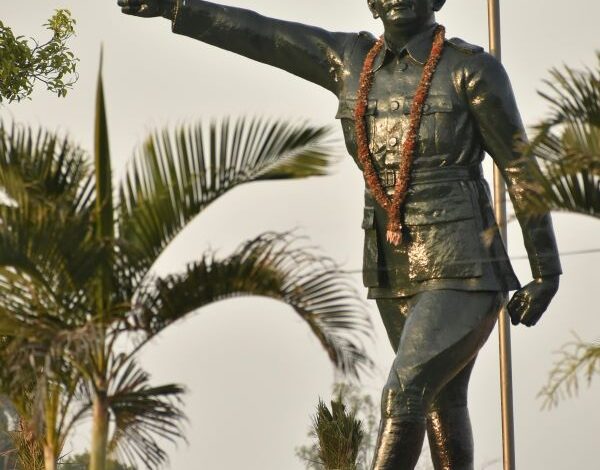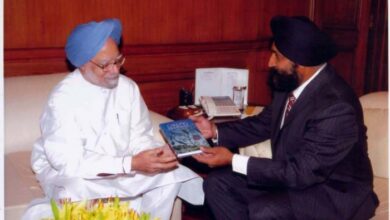Justice, equality & democracy was the vision of Netaji
Ambedkar acknowledged that Bose rightly emphasised that political freedom must be the forerunner to social and economic freedom

 Netaji Subhas Chandra Bose, a towering figure in the pantheon of India’s freedom struggle, continues to inspire generations with his vision, determination and above all fearlessness, which still ignites the youth spirit of a progressive India. As we commemorated his 127th birth anniversary on January 23, 2024, as ‘Parakram Divas’, his unwavering commitment to the cause of independence and unparalleled leadership qualities bind the entire nation and many in the world arena.
Netaji Subhas Chandra Bose, a towering figure in the pantheon of India’s freedom struggle, continues to inspire generations with his vision, determination and above all fearlessness, which still ignites the youth spirit of a progressive India. As we commemorated his 127th birth anniversary on January 23, 2024, as ‘Parakram Divas’, his unwavering commitment to the cause of independence and unparalleled leadership qualities bind the entire nation and many in the world arena.
Subhas Chandra Bose envisioned a free India, unshackled from the chains of colonialism. His vision was rooted in justice, equality, and democracy. Unlike many of his contemporaries, Bose believed that a mere transfer of power to Indian hands was not enough; he sought complete independence. His famous call, “Give me blood, and I shall give you freedom!” epitomises his determination and commitment to the cause.
Born on January 23, 1897, in Cuttack, Odisha, Bose, the ninth child of Janakinath Bose and Prabhavati Devi, emerged as a charismatic leader deeply passionate about India’s freedom. The early influence of Swami Vivekananda on Subhash Chandra Bose could be seen in the communication between them. In a letter dated November 4, 1901, Swami Vivekananda offered guidance that would leave an enduring mark on Bose’s aspirations. Vivekananda’s words, “Give up the idea that by ruling over others, you can do any good to them. But you can do a great deal of good to yourselves.” This underlines the importance of selfless service and the pursuit of collective welfare over personal power. This advice resonated with Netaji’s vision of a free and self-reliant India.
Bose was a visionary leader who recognised the importance of a united and strong India. His advocacy for a secular and inclusive society showcased his progressive ideals. The Azad Hind Fauj, also known as the Indian National Army (INA), brought together people from diverse backgrounds, transcending linguistic, religious, and regional differences. This reflected his vision for a united India, where every citizen had an equal stake in the nation’s progress.
His progressive ideals were evident in his advocacy for a secular and inclusive society, as noted by historian Sugata Bose who states that “Subhas Bose was truly a secular leader who championed the cause of a united India beyond religious and regional differences.”
The INA drew its members from diverse linguistic, religious, and regional backgrounds, showcasing Bose’s vision of national unity. Historian Leonard Gordon emphasises this point, stating, “The INA was Subhas Chandra Bose’s greatest contribution to Indian nationalism… it united Indians of all classes, communities, and regions in common cause.”
Netaji’s vision for an India where every citizen had an equal stake in progress is evident in his efforts to bridge divides and create a collective identity, as seen in the INA’s motto, “Ittefaq, Itemad, Kurbani” (Unity, Faith, Sacrifice).
Bose’s profound influence on subsequent Indian leaders is indisputable, leaving an enduring mark on the nation’s trajectory post-independence. His unwavering commitment to a self-reliant India resonates in the economic policies of later leaders.
As historian Ramachandra Guha observed, “Netaji’s vision of economic self-sufficiency laid the groundwork for independent India’s development strategies.” This influence is palpable in many such initiatives even to this contemporary date such as ‘Startup India’, ‘Atmanirbhar Bharat’, and others, where the emphasis on indigenous development mirrors Netaji’s ideals.
Renowned author and scholar, late Khushwant Singh, aptly captured this legacy, stating, “Netaji’s call for self-sufficiency was a clarion call that reverberated through generations, shaping the very fabric of India’s economic ethos.”
In essence, Netaji’s visionary principles continue to guide India’s pursuit of self-reliance, manifesting in policies that strive for sustainable, homegrown development.
Bose’s profound impact on India’s Constitution is evident in Dr BR Ambedkar’s incorporation of Bose’s ideals into the framework. Ambedkar, recognising Bose’s emphasis on social justice, championed a caste-free and egalitarian society. This influence is reflected in the Constitution’s commitment to Fundamental Rights. For instance, Netaji’s vision aligns with Article 15, which prohibits discrimination on grounds of religion, race, caste, sex, or place of birth.
Ambedkar himself acknowledged Bose’s influence who rightly emphasised that political freedom must be the forerunner to social freedom and economic freedom — underscoring the shared commitment to an inclusive and just nation.
Historians and writers have extensively documented Netaji’s life and legacy, providing valuable insights into his vision for a free India. Sugata Bose, a historian and grandnephew of Subhas Chandra Bose, in his book His Majesty’s Opponent, provides a comprehensive and nuanced account of Netaji’s life, tracing his evolution as a leader and his impact on India’s struggle for independence.
It is crucial to reflect on how his legacy can be carried forward. The principles of unity in diversity, social justice, and a relentless pursuit of freedom remain as relevant today as they were during the independence movement.
In this direction, first and foremost, fostering a sense of national pride and unity is essential. Further, Netaji’s emphasis on a united India, irrespective of linguistic or religious differences, should guide our efforts to build a harmonious society.
Second, the commitment to social justice must continue. Efforts to eradicate caste-based discrimination and ensure equal opportunities for all citizens align with Netaji’s vision for an egalitarian society.
Last but not least, the spirit of self-reliance and sovereignty should be upheld. In an era of globalisation, preserving and promoting indigenous industries and innovation is vital to honouring Netaji’s dream of a self-sufficient India.
Let us draw inspiration from his ideals and work collectively to fulfil the vision of a strong, prosperous, and just India. Netaji’s legacy is not just a chapter in history; it is a guiding light for the nation’s future.




